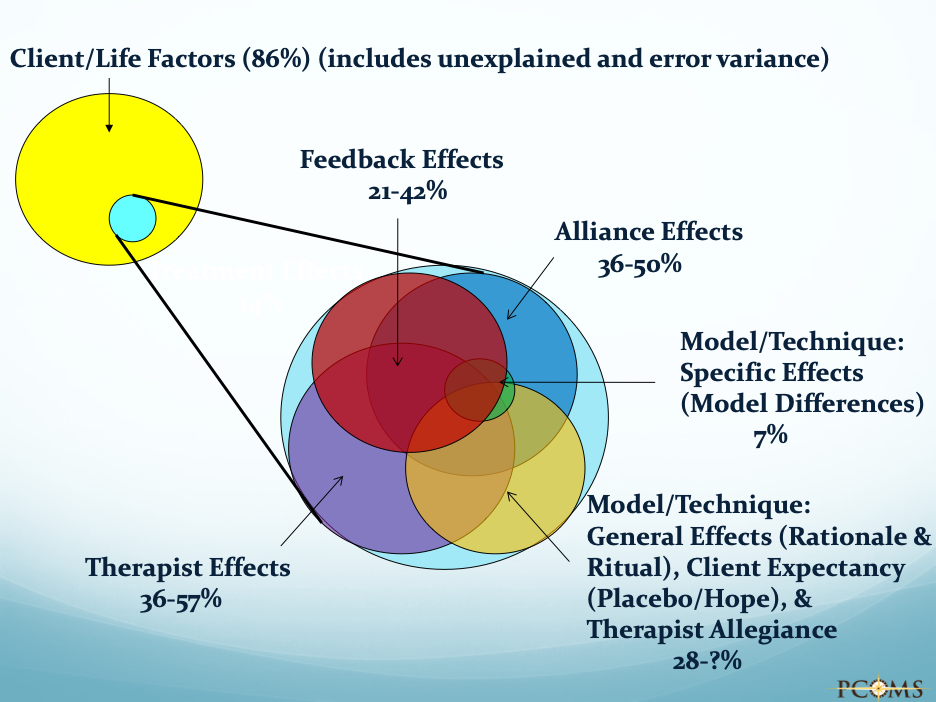Closing the Gap Between More and Less Effective Therapists

Unless you have been hiding under a rock, don’t read anything other than social media pablum, are part of a cult of some model, or just don’t think about or care about your effectiveness, you are probably aware that there is overwhelming evidence that supports routine outcome monitoring (ROM) or measurement-based care (MBC) or progress feedback (PF), or whatever you want to call the process of systematically attaining client feedback about the benefit of provided services and altering treatment as necessary.
Most of the evidence comes from two sources: Lambert’s Outcome Questionnaire 45.2 System and Duncan’s Partners for Change Outcome Management System (PCOMS).
Our Latest Example of the Evidence: PCOMS in Integrated Care
PCOMS was evaluated in three integrated Federally Qualified Health Care Centers in Colorado. The study conducted by Drs. Barry Duncan, Jeff Reese, Brian DeSantis and colleagues, published in Families, Systems, & Health reported:
- Double overall outcomes with PCOMS patients.
- PCOMS patients dropped out 30% less and attended 22% more sessions.
- 43% more PCOMS patients achieved clinically significant change.
There are now ten randomized clinical trials (RCT) that demonstrate similar results, eight of which were conducted by Drs. Duncan, Reese, Chapman and the Better Outcomes Now Team.
The New Study. (Delagadillo et al., 2022): Leveling Therapist Effects

While you may know about the substantial evidence that ROM both improves outcomes and reduces dropouts, which is surely reason enough to give it a try, a new study, just published, demonstrated that systematic client feedback also closes the gap between more and less effective therapists. Therapist effects, as portrayed above, loom large in the delivery of services, accounting for up to 57% of treatment outcomes. The study:
Delagadillo, J., Deisenhofer, A.K., Probst, T., Shimokawa, K., Lambert, M.J., & Kleinstäuber (2022). Progress feedback narrows the gap between more and less effective therapists: A therapist effects meta-analysis of clinical trials. Journal of Consulting and Clinical Psychology, 90 (7), 559-567. https://doi.org/10.1037/ccp0000747
From the Article: What is the public health significance of this article?
Several narrative and meta-analytic reviews have shown that psychological treatment outcomes vary systematically between therapists, such that some therapists attain considerably higher completion rates, faster symptom reductions, and better overall treatment outcomes. This phenomenon, known as therapist effects (TEs), is an important source of systematic inequity in treatment outcomes, since a patient’s progress will partly depend on which therapist they see. Progress feedback is a quality assurance method hat has been shown to improve treatment outcomes in clinical trials and meta-analyses. The present study reanalyzed data from six clinical trials of progress feedback, demonstrating that this strategy reduced TEs in a university counseling setting. Evidence from this study indicates that progress feedback helps to improve the effectiveness of therapists who otherwise attain below-average treatment outcomes, making it a useful tool for practice development.
Replication and Confirmation of Our Findings
This study is great news for any behavioral health organization wishing to raise the bar of effectiveness across its therapists using outcome measures and feedback informed treatment. But we have known that client feedback levels therapist performance for some time. We observed this in different mental health and substance abuse settings who implemented PCOMS over the years but we also found the same thing, on a smaller scale, in our 2009 RCT (Anker, Duncan, & Sparks, 2009). Less effective therapists (those who had the worst outcomes without feedback) benefited more from feedback that the most effective therapists. In other words, the effects of feedback are more pronounced for those therapists with poorer outcomes, and therefore the benefits of feedback are exerted by improving the outcomes of less effective therapists.
Bottom Line: We know that therapist effects and therapist variability are important factors in the delivery of behavioral health services. Systematic client feedback offers a clear path to address these factors and improve the quality of services.
